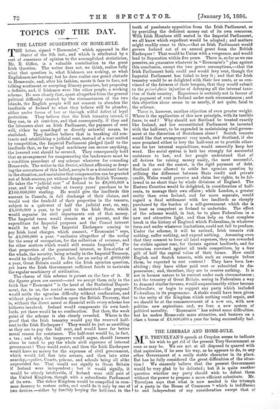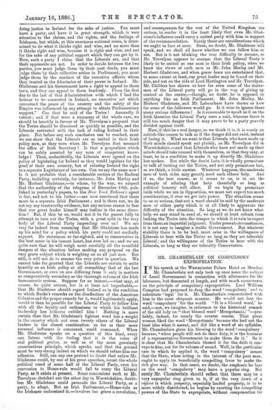THE LIBERALS AND HOME-RULE.
MR. TREVELYAN'S speech at Croydon seems to indicate his wish to get rid of the present Tory Government as soon as may be. We are not at all disposed to quarrel with that aspiration, if he sees his way, as he appears to do, to any other Government of a really stable character in its place. But has he fully considered the great difficulties of the situa- tion? We sincerely believe that the present Government would be very glad to be defeated ; but it is quite another question whether any party should wish to defeat them without the power to propose a more efficient substitute. Mr. Trevelyan says that what is now needed is the triumph of a party in the House of Commons "which is indifferent to and independent of any consideration except that of doing justice to Ireland for the sake of justice. You must have a party, and have it in great strength, which Is very attentive to the claims, and the rights, and the feehngs of Irishmen, but which, at this enormous national crisis, is deter- mined to do what it thinks right and wise, and no more than it thinks right and wise, because it is right and wise, and not for the sake of any political support which they can get by it. Now, such a party I claim that the Liberals are, and that their opponents are not. In order to decide between the two parties, you must judge them by their past deeds, you must judge them by their collective action in Parliament, you must judge them by the conduct of the executive officers whom they trusted as the fiduciaries of their power in Ireland. Mr. Gladstone and his Government have a right to appeal to those tests, and they can appeal to them fearlessly. From the first day to the last of that Administration with which I had the honour to be connected in Ireland, no executive act which concerned the peace of the country and the safety of the Empire was influenced by any attempt to obtain Parliamentary support." Can that be said of the Tories ? Assuredly it cannot ; and if that were a summary of the whole case, we should be heartily in favour of Mr. Trevelyan's proposal that the Tories should be dismissed as quickly as possible, and the Liberals entrusted with the task of ruling Ireland in their place. But before any such conclusion can be reached, must we not show that the Liberals are as united in their Irish policy now, as they were when Mr. Trevelyan first assumed the office of Irish Secretary ? Is that a proposition which can be safely asserted by any man of competent know- ledge? Then, undoubtedly, the Liberals were agreed on the policy of legislating for Ireland as they would legislate for the good of their own country, but of refusing Ireland the right to a separate Legislature of her own. Can we say the same now ? Is it not probable that a considerable section of the Radical Party, including certainly, for instance, Mr. John Morley and Mr. Herbert Gladstone,—to whom, by the way, we suspect that the authorship of the telegram of December 18th, pub- lished in yesterday's papers, to the New York Tribune's agent is due, and not to his father,—are now convinced that there must be a separate Irish Parliament ; and is there not, we do not say any trustworthy evidence, but any serious reason to fear that our great leader himself may incline in the same direc- tion? But, if this be so, would not it be the purest folly to attempt to turn out the Tories, with a great split in the very body of the Liberal Party impending over us ? We are very far indeed from assuming that Mr. Gladstone has made up his mind for a policy which his party could not cordially support. No statesman so far-sighted, and so conservative in the best sense in his inmost heart, has ever led us ; and we are quite sure that he will weigh most carefully all the manifold dangers of the situation before making any proposal on the very grave subject which is weighing on us all just now. But still, it will not do to assume the very point in question. We cannot take for granted that the Liberals are certain to unite heartily on an Irish policy at all resembling that of the last Government, or even on one differing from it only in matters so comparatively secondary as the thorough reform of the Irish bureaucratic system. Suppose for an instant,—what may, of course, be quite untrue, but is at least not improbable,— that Mr. Gladstone should regard Ireland as in the condition to which Burke'a remarks on the disaffection of the American Colonies and the proper remedy for it, would legitimately apply, would it then be possible for the Liberal Party to follow him with all the loyalty and enthusiasm to which his brilliant leadership has hitherto entitled him ? Nothing is more certain than that Mt. Gladstone's lightest word has a weight in the country which not even twenty others of the Liberal leaders in the closest combination, so far as their mere personal influence is concerned, could command. When Mr. Gladstone speaks on a question of this kind, every one listens with the feeling that it is the voice of real political genius, as well as of the most genuinely conscientious principle, which speaks, and that the ground must be very strong indeed on which we should refuse him our adhesion. • Still, can any one pretend to doubt that unless Mr. Gladstone could, by one of his great speeches, recast the whole political creed of some half of the Liberal Party, even his conversion to Home-rule would fail to carry the Liberal Prey, as it exists at present. Some concessions such as Mr.
Trevelyan sketched out the other day in Warwickshire, doubt- less Mr. Gladstone could persuade the Liberal Party, as a party, to adopt. But an Irish Parliament,—Home-rule as the Irishmen understand it,—involves too grave a revolution, and consequences for the rest of the United Kingdom too serious, to render it in the, least likely that even Mr. Glad- stone's influence could carry a united party with him in support of the recommendation. Surely these are considerations which we ought to face at once. Soon, no doubt, Mr. Gladstone will speak, and we shall all know whether we can follow him or not. But is it not blinking the true difficulty to assume, as Mr. Trevelyan appears to assume, that the Liberal Party is likely to be united as one man in their Irish policy, when we know the views of such men as Mr. John Morley and Mr. Herbert Gladstone, and when grave fears are entertained that, to some extent at least, our great leader may be found on their side, and not on the side of Lord Hartington and Mr. Trevelyan. Mr. Childers has shown us how far even some of the states- men of the Liberal party will go in the way of giving up control at the centre,—though, no doubt, he is opposed to anything like an Irish Parliament. Mr. John Morley, Mr. Herbert Gladstone, and Mr. Labouchere have shown us how far some of the followers would go. Is it wise to ignore. these many serious differences ? Is it reasonable to speak as if on the Irish Question the Liberal Party were a unit, whereas there is still too much danger that it may prove to be a party gravely divided against itself.
Now, if this be a real danger, as we think it is, it is surely an ostrich-like course to talk as if the danger did not exist, instead of facing it. What we want is that Liberals who have made up their minds should speak out plainly, as Mr. Trevelyan did in Warwickshire,—and that Liberals who have not made up their minds should take counsel with themselves, so that they may, at least, be in a condition to make it up directly Mr. Gladstone has spoken. But while the doubt lasts, it is wholly premature to talk of turning out the Tories, and not only premature but, as we think, a little unwise. Whatever happens, the moderate men of both sides may greatly need each others' help. And if so, the best course, as it seems to us, is to set the example of offering that help cheerfully so long as political honesty will allow. If we begin by premature raids while we are in Opposition, we must not expect too much consideration, if ever we get into power. The situation seems to us so serious, that not a word should be said by the moderate men of either party which is at all likely to aggravate the difficulty of the situation. So long as we do not know what help we may stand in need of, we should at least refrain from lashing the Tories into the temper in which it is vain to expect from them an impartial judgment. Under present circumstances, it is not easy to imagine a stable Government. But whatever stability there is to be had, must arise in the willingness of Liberals to bear with the Tories so long as they are tolerably Liberal ; and the willingness of the Tories to bear with the Liberals, so long as they are tolerably Conservative.



































 Previous page
Previous page